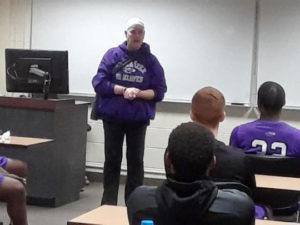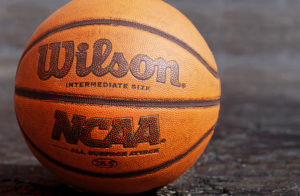Building toughness in all walks of life
With another season in the books, many of us have taken a deep breath and started to take stock, rebuild or retool for what’s next. What now?
Coaching techniques with modern technology is amazing. The players are stronger, quicker and their abilities are off the charts. However, has toughness increased for the better? Have strategies to develop and teach toughness improved?

This Hall of Fame basketball and volleyball player from the University of Wisconsin–Waukesha is tough. Her toughness and energy made me realize the importance of teaching and embracing toughness. Robyn spoke to our college players on “toughness” this past season after one of our games. The team, and her doctors, are amazed at how she’s attacking this dreaded disease with her positive spirit and attitude.
Defining toughness
Toughness is a word used all the time. However, very few know the true meaning of it. For years, the word was associated with boxing, wrestling, street fighting, gangs, thugs and bullying to name a few. Today, the word toughness has a totally new meaning. Toughness is a way of life with great leaders, and coaches teaching and embracing positive life lessons for so many athletes. Tough people embrace disappointments and struggles, which make them a stronger person, player or worker.
Successful athletes and workers have that inner drive to succeed. They believe in winning each and every day with all details of their lives — that’s toughness. They see what’s in front of them and attack any situation.
There are four things we can control in our lives — focus, attitude, preparation and effort. Tough people thrive on each. How is your focus with everything? Is your attitude positive? Are you prepared daily at school, at work and at practice? How is your effort on a daily basis?
We may not be elite coaches or elite athletes, but we can all have that elite drive with a championship focus, attitude, preparation and effort. Coaches and bosses ask all the time, “Do you want to perform at a higher level?” That must come from within.
I really believe toughness wins in life. Academic toughness is created by:
- Attending every class with a passion.
- Sitting in the first three rows and contributing in every class.
- Joining in with a great attitude.
- Leading and helping others in school.
Tough leaders take on a huge role by spreading their high standards with focus and work ethic to many. You often hear coaches say “tough players win” (TPW), and these players all have an attitude the includes:
- Loving to practice.
- Winning at practice every day with every drill.
- Embracing the meaning of team.
- Working hard to help all teammates become successful.
- Knowing how to stay clear of trouble and promote the real meaning of training.
- Conditioning year-round.
 Tough people grow and share their values with many. They radiate positives vibes. They do not lose their passion. They do not get tired. Toughness is being coachable, and they are all-in for the success of the program, showing trust and listening intently.
Tough people grow and share their values with many. They radiate positives vibes. They do not lose their passion. They do not get tired. Toughness is being coachable, and they are all-in for the success of the program, showing trust and listening intently.
Toughness is a way of life with strong and dedicated people. These qualities of toughness are all teachable and must be reinforced each and every day. For many of you who feel toughness is only for a select few, this simply is not true. As coaches and leaders, many of the values we believe in and the teaching of positive toughness rubs off on players and workers. This positive energy grows every day.
Coaching toughness
Coaching team toughness has a high cost for everyone, but the rewards are well worth it. Some of the costs include:
- Assessing and improving fitness both mentally and physically for all.
- Meeting every deadline and understanding the value of time management.
- Embracing responsibility and accountability.
- Preparing and attacking the daily battles head on.
Leaders in all professions are constantly watched and judged. People want to see if that leadership is day-to-day or hit-and-miss. Coaches are observed by the team on how well they’re prepared, how their daily teaching approach is consistent with their goals, how they’re dressed, and how they handle obstacles and defeat.
Tough coaches send a tremendous message, whether positive or negative. Players see our toughness by how we work and coach. Knowing when and how to discipline, and knowing how to attack mistakes are important.
Coaching methods have changed. Positive coaching certainly outweighs negative coaching and must be consistent. There is a way to correct mistakes by being tough and positive. We all go through tough times with our coaching. Tough times help us become a strong coach and a stronger team with the right touch.
Texas Southern head coach Mike Davis said, “You can’t train your brain to stay focused unless you go through tough times.” How coaches handle those tough times makes the team tougher or weaker. Our passion, work ethic, teaching, compassion, focus and preparation is on display daily for all to see. Thus, coaching toughness rubs off on our teams. When players and workers know their roles and know we care about each and every one of them, toughness follows. They want to be like you and they will win for you.
Don’t separate your coaching and teaching from your team. Show them the true meaning of toughness.
Dick Luther is an assistant men’s basketball coach at the University of Wisconsin-Whitewater and recently completed his 52nd year of coaching. He was inducted into the UW-Waukesha Hall of Fame in 2007, the Waukesha South High School Blackshirts Wall of Fame in 2014, and the Wisconsin Basketball Coaches Association Hall of Fame in 2016. His online teachings are available on Twitter at @DickLuther. Learn more at www.coachdickluther.com.









